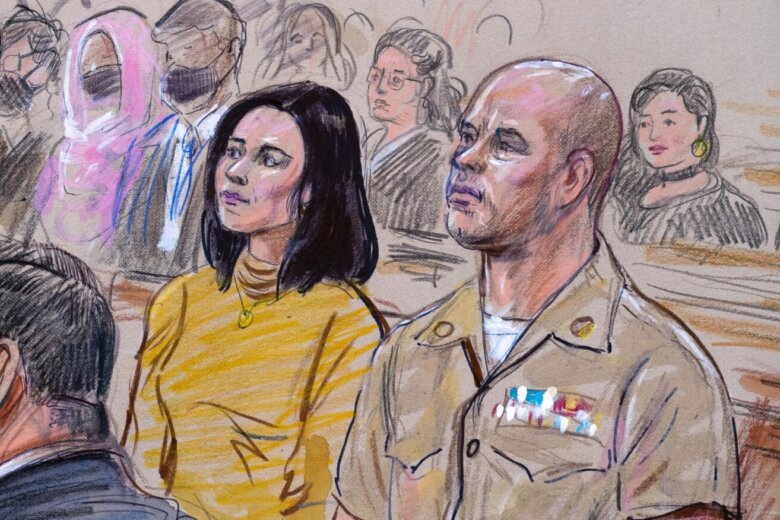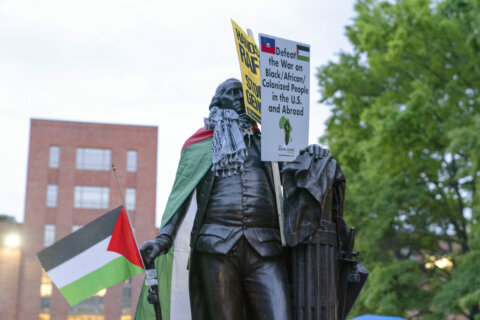
The U.S. government has warned a Virginia judge that allowing an American Marine to keep an Afghan war orphan risks violating international law and could be viewed around the world as “endorsing an act of international child abduction,” according to secret court records reviewed by The Associated Press.
It is rare for the federal government to step into a local custody case, but concern about the child’s fate has stretched across the Trump and Biden administrations. The Justice Department argued in the court documents that the dispute has ramifications that extend far beyond the rural courthouse where the girl’s future is being decided.
Failing to return the child, now 4, to Afghan relatives in the U.S. could jeopardize American efforts to resettle Afghan refugees, threaten international security pacts and might be used as propaganda by Islamic extremists — potentially endangering U.S soldiers overseas, Justice Department attorneys and other U.S. officials warned in court filings seeking to intervene in the case.
The Justice Department was particularly scathing in its assessment of how Marine Maj. Joshua Mast and his wife convinced a Virginia judge to sign off on the adoption of the girl, who has been in their custody since 2021.
Citing a litany of “falsehoods,” the Justice Department wrote that the court relied on “intentional misrepresentations” from the Marine and skipped critical safeguards to protect children being brought to the United States.
“The grave harm that the Masts have inflicted upon the Child, her family, and the United States is ongoing,” Justice Department lawyers wrote in the court documents, which included signed declarations from State and Defense department officials. “Most troublingly, the child remains with the Masts to this day.”
The documents were filed under seal this summer in the bitter custody battle over the child who was pulled by U.S. forces in 2019 from the rubble of a military raid.
Mast, who was on a short assignment as an attorney in Afghanistan, met the baby in a U.S. military hospital and became determined to bring her home.
The Masts and the girl’s Afghan relatives, who are suing to get her back, have been ordered not to speak publicly about the case, and their lawyers did not respond to requests for comment.
But in earlier court filings, Mast’s attorneys have written that the Marine and his wife acted in good faith and worked at “great personal expense and sacrifice” to protect the baby and “provide her a loving home.”
Until now, the federal government’s role in the case has remained mostly a mystery. The government filings reviewed by the AP represent just a fraction of the thousands of pages of documents, transcripts and exhibits that remain under seal, locked away with no word of when the public will be allowed to see them.
The AP in January took legal action to unseal the case and a Virginia judge agreed to do so. Yet nine months later, the documents remain secret. It is unclear how the Masts responded to the Justice Department’s court filings.
In arguing that the girl should be returned to her Afghan relatives, the Justice Department wrote that the Masts, who were living in Fluvanna County at the time, convinced their local circuit court judge Richard E. Moore in 2019 that the child — 7,000 miles away — was the “stateless” daughter of foreign fighters from an unknown neighboring country, and that the Afghan government intended to waive jurisdiction over her. A year later, Moore, who has since retired, made the adoption permanent.
The child, however, was never “stateless,” the Afghan government did not relinquish its claim over her, and the orders “were obtained fraudulently by the Masts, who knowingly made false representations before the Virginia courts,” the Justice Department wrote.
Virginia law requires that whoever has physical custody of a child be given an opportunity to be heard in an adoption case. But the Virginia court failed to notify the U.S. government of Mast’s custody petition, the Justice Department argued.
At the time, the baby was in the custody of the U.S. government, being treated at a military hospital in Kabul. The Afghan government was tracking down relatives, a State Department official wrote, and found an uncle who reported that the girl’s father, a farmer, had been slain in the raid, along with his wife and five other children.
The documents reveal for the first time that concern about Mast’s actions — and the court’s decisions — reached the highest levels of the Trump administration. When the U.S. Embassy in February 2020 was working with the Afghan government to unite the child with her surviving relatives, Mast tried unsuccessfully to stop them, claiming the Afghan family was not biologically related.
Then-Secretary of State Mike Pompeo signed a cable to the embassy in Kabul that described Mast’s custody order from Fluvanna County as “flawed in a number of respects,” and questioned how any American court could have jurisdiction over an Afghan child.
Pompeo’s cable said the State Department had “concerns about the perception of the U.S. government holding an Afghan child against the will of her extended family and the Afghan government.”
The Red Cross took her to the Afghan family, who wept when they met her, according to a State Department declaration attached to the court filings. A young newlywed couple, the child’s cousin and his wife, raised her for the next 18 months.
The Justice Department declined to comment. The State Department referred AP to a prior statement saying it has acted appropriately by supporting efforts to find the girl’s surviving kin and reunify the family in Afghanistan.
As the family grew and bonded, Mast tracked them down and tried to convince them to send the child to the United States by promising medical care, the Afghan family told AP last year. They said they refused to go along with the plan; they didn’t want to be separated from the girl, who appeared to have fully recovered from a fractured skull, broken leg and serious burns.
Later, in the summer of 2021, when U.S. troops withdrew from Afghanistan and the Taliban took over, Mast reiterated his offer of assistance, “misleading” the couple into believing the child would receive specialized medical treatment, the Justice Department wrote. Mast helped arrange a Defense Department evacuation of the Afghan family by “falsely telling other military personnel that he was clear to bring the Child,” the Justice Department wrote.
When the Afghans arrived at a refugee resettlement camp in Virginia, the Justice Department wrote, Mast presented the adoption order to federal employees, who didn’t know that the U.S. government had already deemed his claim to the girl to be flawed. Unwittingly, those employees helped Mast take custody of the child, and she’s been with him ever since.
Fluvanna County Circuit Court Judge Claude Worrell, who took over the case, has said the government shoulders some blame for the girl ending up in the Masts’ custody. He noted multiple federal employees and agencies helped Mast along the way.
“The left hand of the United States is doing one thing and the right hand of the United States is doing something else,” Worrell said.
Mast is assigned to the Marine Corps Special Operations Command at Camp Lejeune in North Carolina, and the agency is fully cooperating with federal law enforcement investigations, according to a spokesperson. Earlier, a Marine official said at least one investigation focused on the alleged unauthorized removal and retention of classified documents or material. Records indicate that the Department of Homeland Security and the FBI have also been involved.
Worrell voided the adoption in March, but left the child with the Masts, citing a custody order. That decision has been appealed by the Masts.
In the meantime, the Biden administration argued in the filings that ongoing delays and “a narrative that a U.S. servicemember stole a Muslim child” are harming America’s standing on the world stage, particularly in Afghanistan, where the U.S.’s withdrawal left a fragile nation behind.
“The perception that the United States is a place where Afghan children can be taken from their families, over their families’ objection, without effective recourse, increases those perceived risks,” a State Department official wrote in a declaration, “to the detriment of U.S. foreign policy interests.”
Copyright © 2024 The Associated Press. All rights reserved. This material may not be published, broadcast, written or redistributed.








